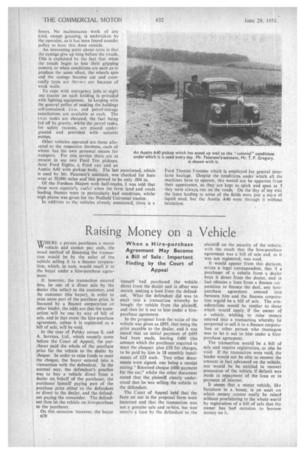Raising Money on a Vehicle
Page 94

If you've noticed an error in this article please click here to report it so we can fix it.
When a H ire-purchase Agreement May Become a Bill of Sale : Important Finding by the Court of Appeal WJEIERL, a person purchases a motor IT vehicle and cannot pay cash, the usual method of financing the transaction would be by the seller of the vehicle selling it to a finance corporation, which, in turn, would resell it to , the buyer under a hire-purchase agreement.
If. however, the transaction entered into, be one of a direct sale by the dealer (the seller) to the customer, and the customer (the buyer), in order to raise some part of the purchase price, is financed by a finance corporation or other lender, the odds are that the transaction will be one by way of bill of sale, and in that event the hire-purchase agreement, unless it is registered as a bill of sale, will be void.
In the case of Polsky versus S. and A. Services, Ltd., which recently came before the Court of Appeal, the purchaser paid the whole of the purchase price for the vehicle to the dealer by cheque. In order to raise funds to meet the cheque, the buyer entered into a transaction with the defendant. In the normal way, the defendant's practice was to buy a vehicle direct from a dealer on behalf of the purchaser, the purchaser himself paying part of the purchase price either to the defendant or direct to the dealer, and the defendant paying the remainder. The defendant then let the vehicle on hire-purchase to the purchaser.
On this occasion however, the buyer B20 himself had purchased the vehicle direct from the dealer and in effect was merely seeking a loan from the defendant. What the defendant did was to enter into a transaction whereby he bought the vehicle from the plaintiff, and then let it out to him under a hirepurchase agreement.
In the proposal form the value of the vehicle was given as £895, that being the price payable to the dealer, and it was stated that an initial payment of £495 had been made, leaving £400 (the amount which the purchaser required to meet the cheque) plus £50 for charges, to be paid by him in 18 monthly instalments of £25 each. Two other documents were signed. one being a receipt stating " Received cheque £400 payment for the car," whilst the other document stated that the plaintiff clearly understood that he was selling the vehicle to the defendant.
The Court of Appeal held that the facts set out in the proposal form were incorrect and that the transaction was not a genuine sale and re-hire, but was me]elv a loan by the defendant to the plaintiff on the security of the vehicle, with the result that the hire-purchase agreement was a bill of sale and, as it was not registered, was void.
It would appear from this decision, writes a legal correspondent, that ;f a purchaser of a vehicle from a dealer buys it direct from the dealer, and in fact obtains a loan from a finance cor poration to finance the deal, any hirepurchase agreement entered into between him and the finance corporation would be a bill of sale. The considerations would be similar to those which would apply if the owner of a vehicle, wishing to raise money entered into a transaction whereby he purported to sell it to a finance corporation or other person who thereupon was to let it out to him under a hirepurchase agreement.
The transaction would be a bill of sale and require registration, or else be void. lithe transaction were void, the lender would not be able to recover the amount in fact advanced on the vehicle, nor would he be entitled to recover possession of the vehicle if default was made in repayment of the loan or in payment of interest.
It seems that a motor vehicle, like furniture in a house, is an asset on which money cannot easily be raised without proclaiming to the whole world by registration of a bill of sale that the owner has had occasion to borrow money on it.












































































































































